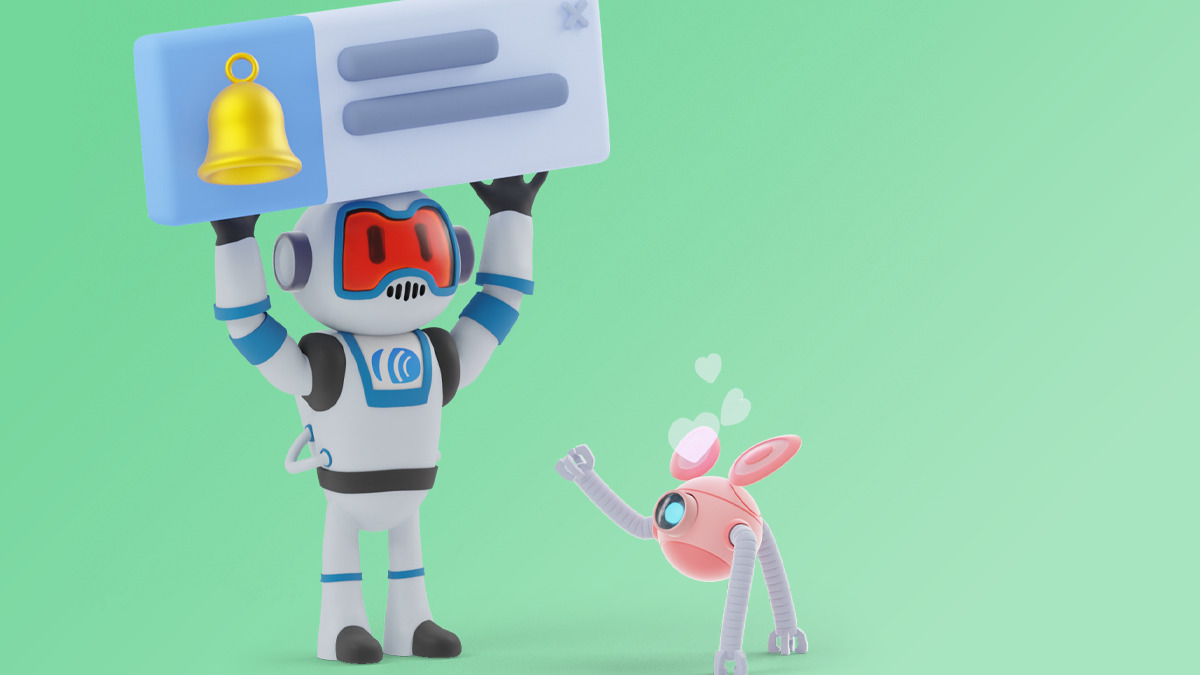
Every blogger knows growing a list of engaged followers takes time and effort. Even if you have a loyal readership, growth plateaus are not uncommon.
If you find yourself in a growth rut, you may need to jump-start your interactions with your readers. You could develop awesome lead magnets or other incentives to entice them to give you their email address. Or you could try a different approach altogether.
What if there was a new way to connect with the visitors and get them to your website, even those who are not comfortable giving you their email address? Wouldn't it be awesome if you could display a message directly to one of your web visitor's browsers, even when they aren't on your website?
And how cool would it be to have an easy to use way to instantly add website visitors to a list without requiring them to input their email address?
With web push notifications, all of the great stuff I mentioned above can become reality. In one click, they can be added to your web push notification list — making it super easy for you to start sending instant messages to your audience.
Plus, when you combine email marketing with web push notifications, you create a targeted multi-channel campaign that increases engagement and revenue.
And if you are an AWeber customer, web push notifications are included in AWeber Free and AWeber Pro — at no additional cost!
What are web push notifications?
Web push notifications are short, and clickable messages delivered straight to a subscriber's desktop when they have a browser open.
You've probably already seen web push notifications, even if you never subscribed to one. It's not an intrusive pop-up, but a notice from your browser, letting you know the site you are visiting would like to send web push notifications.
Each browser may display a push notification a bit differently, but most likely, you have seen something like this:

When you click “allow,” you become a subscriber to that website's web push notifications and are giving them permission to send you real-time notifications.
How do web push notifications work for bloggers?
Web push notifications are super easy to create and can be done even by those with little or no technical background.
They slide in either on the top or bottom right-hand corner of the screen, depending on the operating system.

Web push notifications are incredibly effective because you are given permission to speak directly to your website visitors, even when they are not currently on your website, landing page, or reading an email.
Once a subscriber, visitors will receive short, one-time messages on their desktop when they have a web browser open.
Web push notifications can link directly to a blog, website, landing page, sign up form, or shopping cart — basically anything with a link.
Web push notifications make promoting your blog easy
Web push notifications are one of the easiest ways to grow your business and turn your passion into profits. It lets you quickly increase engagement to reach more people and make more money.
4 ways bloggers use web push notifications
Below are a few of our favorite ways AWeber customers are using web push notifications to grow their blogs.
Motivate customers to reach their goals with daily tips
Donna Partow is a content creator, author, and motivational speaker with a passion to empower people to accomplish their life mission. Her books have sold more than a million copies worldwide and have been translated into numerous languages. She was part of the team that pioneered ivillage.com, serving as the Work From Home coach and co-creating one of the first content providers on the internet.
Donna uses web push notifications for a specific purpose. She primarily sends them to a select group that signs up to be part of one of her challenges. The push notifications serve as both a reminder and the mechanism to deliver her content for the challenges.
"One of the hottest things on the internet right now for content creators is running challenges to bring people into a relationship with you. I'm really excited about using web push notifications for limited-time challenges, 7-day challenges, and 10-day challenges. Each day, I send them a little reminder with a link that connects to their assignment for the day to keep them moving forward on their goal. I want them to be glad and thankful that they're receiving my web notifications because it's going to be a benefit to them."
Donna Partow
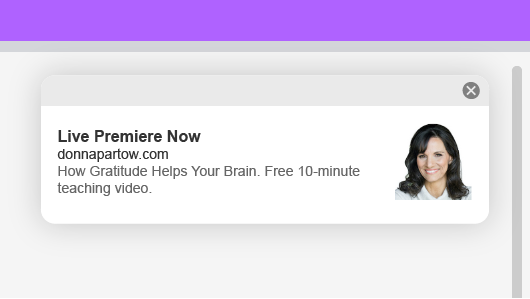
Notify followers instantly when you create new content
Jennifer Reinhard, cloth diaper educator and advocate, who shares her real life experience and common sense advice to make using cloth diapers easier to understand, use and wash. Her business, All About Cloth Diapers, for over a decade has been sharing their cloth diaper experience and knowledge with parents. Jennifer sincerely believes that cloth diapers are the best thing for babies and she wants to help spread her love of cloth diapers one fluffy tush at a time!
Jennifer uses web push notifications to share new content and evergreen content to her audience. Her goal is to encourage new visitors to subscribe, since they are the people looking to learn about cloth diapers. She hopes web push notifications make uncovering education easy for them as web push notifications will put that content right in front of them, exactly when they need it.
"Web push notifications are another method to reach my readers. They may not read the email or see Facebook posts, but they will see the web push notification because it will pop up on their desktop when they’re online — exactly when they need it. I have not seen anyone else use it yet, and that includes retailers or any other resources or content creators. So I definitely think it would distinguish us from other people.”
Jennifer Reinhardt
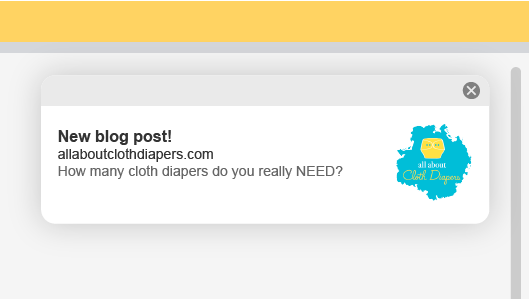
Drive traffic to individual blogs within digital properties
Jamila Bannister is a personal branding strategist and coach. Her business J Bannister Branding helps entrepreneurs leverage personal branding as a marketing strategy. She helps her clients create strong personal brands to become influential and convert this influence into paid opportunities.
Jamila uses Web Push notifications to drive traffic to her online magazine and individual articles within the publication.
“I have an online magazine. What tends to happen is that when I first publish, I get a lot of traffic. But after about a week, the traffic declines. So I use web push notifications to drive traffic back to the online magazine and to specific articles. So instead of writing a blog, people can click and read by using web push notifications and get my most up-to-date content. Another thing I like about AWeber's web push notification is that you can customize the icon so the notification comes up as something from me with my picture.”
Jamila Bannister
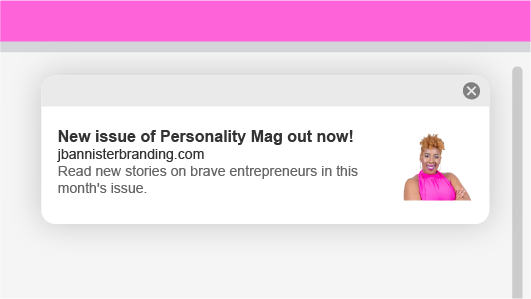
Sell more products with limited-time discount notifications
John Grubb owns Keystone Computer Concepts (4KCC), a full-service computer company. They sell, service and repair computers by providing in-person and remote technical support in the United States, Europe, and Canada.
They also create amazing content to help educate their audience through written content and YouTube videos.
Grubb uses web push notifications for two reasons:
1. To send out time-sensitive security alerts to his audience.
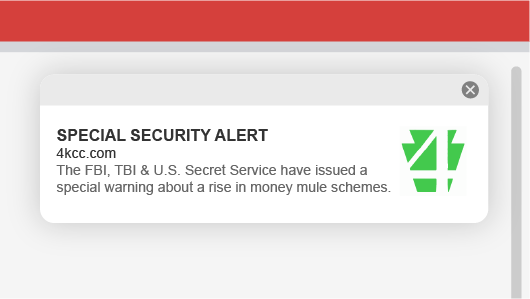
2. To send out notifications when there is a special offer on a particular computer or computer related product
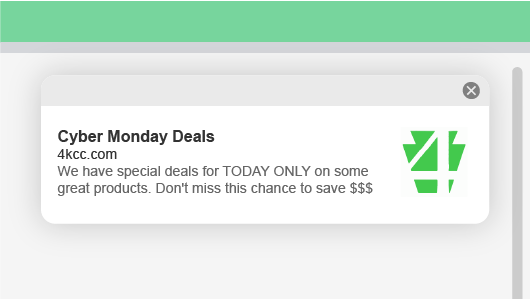
“I limit sending emails to my audience to no more than two a week. My customers appreciate it, because they’ve come to expect 2 emails per week. So the web push notifications are really important to me because I can send out something time-sensitive without an additional email. I get income from affiliate sales but many of the sales are for a very short period of time. I can’t notify my customers if it is on a day I am not sending an email, but I can send out a web push notification.”
John Grubb
Pro tip: Looking to grow your web push notification’s list? In John Grubb’s three-email welcome series, his second email explains what web push notifications are and why they should opt-in to receive these messages.
Web push notification best practices for bloggers
Want to incorporate web push notifications into your own blogging strategy? Follow the best practices below to create web push notifications your audience will no doubt appreciate.
Copy is king
To keep your subscribers engaged, you need to craft compelling, concise content. Web push notifications impose character limits on the headline and the message, so pick your words carefully to make your messages compelling.
One topic per push
Be clear on the point you want to make and the action you want your subscriber to take. Clearer messages tend to have a higher click-through rate.
It’s helpful to understand your audience and the questions they want answers to. Create content around these questions to drive readers back to your blog through web push notifications.
Create urgency wherever possible
Use scarcity to create urgency to drive specific actions. Be clear about the desired action you want your readers to take when they click their link.
For example, rather than the saying, “Flash Sale Today,” consider “Only a few hours left to save 25% off. This creates a sense of urgency, driving readers to consider the limited-time offer”
Include social proof
When appropriate, work in statements from your existing customers mentioning your products or services.
For example, consider content like, “500 people have already registered today,” or “This post has more than 10,000 Twitter shares.” Include an image from your social platforms.
Get Web Push Notifications
If you're struggling to reach more people, web push notifications could be the answer. Send direct messages to your visitors’ browsers, widen your online reach, and connect with your subscribers through an easy click opt-in.
Plus, AWeber's web push notifications are included in AWeber Free and AWeber Pro — at no additional cost!
The post 4 Ways to Grow your Blog with Web Push Notifications appeared first on AWeber.
from AWeber https://ift.tt/3pW6ksU
via IFTTT
No comments:
Post a Comment